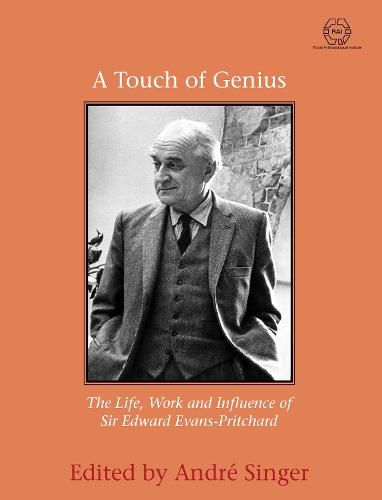Readings Newsletter
Become a Readings Member to make your shopping experience even easier.
Sign in or sign up for free!
You’re not far away from qualifying for FREE standard shipping within Australia
You’ve qualified for FREE standard shipping within Australia
The cart is loading…






This title is printed to order. This book may have been self-published. If so, we cannot guarantee the quality of the content. In the main most books will have gone through the editing process however some may not. We therefore suggest that you be aware of this before ordering this book. If in doubt check either the author or publisher’s details as we are unable to accept any returns unless they are faulty. Please contact us if you have any questions.
Evans-Pritchard was perhaps the most influential anthropological scholar of the twentieth century. His extraordinary work in Africa has formed a central foundation to anthropological thought since the 1930s, with generations of anthropologists having read and appreciated his ethnographies of the Azande, Nuer and Sanusi, and his analyses of social structures, belief systems and history. And yet, though so much has been written about his work, a rounded understanding of the person has proved elusive. This volume covers Evans-Pritchard as a promising student, a young graduate in search of career opportunities, an adventurous cultural explorer, a determined officer in the Second World War, and an ambitious department-building professor with a global reputation. Against a glittering array of contexts and characters - from Malinowski to Marett to the Maharaj of Kutch; from Oxford poets and pubs to Catholic conversion in war-torn Libya - there emerges a fascinating study of a figure who was much more than an innovative anthropologist. A portrait of the man and his time is composed from personal correspondence, archives and familial recollections, contributions from surviving friends and students, and accounts by those, including contemporary African scholars, who continue to debate and re-evaluate his work in all its complexity. This book is a fitting monument to Evans-Pritchard's legacy and a landmark in anthropological historiography.
$9.00 standard shipping within Australia
FREE standard shipping within Australia for orders over $100.00
Express & International shipping calculated at checkout
This title is printed to order. This book may have been self-published. If so, we cannot guarantee the quality of the content. In the main most books will have gone through the editing process however some may not. We therefore suggest that you be aware of this before ordering this book. If in doubt check either the author or publisher’s details as we are unable to accept any returns unless they are faulty. Please contact us if you have any questions.
Evans-Pritchard was perhaps the most influential anthropological scholar of the twentieth century. His extraordinary work in Africa has formed a central foundation to anthropological thought since the 1930s, with generations of anthropologists having read and appreciated his ethnographies of the Azande, Nuer and Sanusi, and his analyses of social structures, belief systems and history. And yet, though so much has been written about his work, a rounded understanding of the person has proved elusive. This volume covers Evans-Pritchard as a promising student, a young graduate in search of career opportunities, an adventurous cultural explorer, a determined officer in the Second World War, and an ambitious department-building professor with a global reputation. Against a glittering array of contexts and characters - from Malinowski to Marett to the Maharaj of Kutch; from Oxford poets and pubs to Catholic conversion in war-torn Libya - there emerges a fascinating study of a figure who was much more than an innovative anthropologist. A portrait of the man and his time is composed from personal correspondence, archives and familial recollections, contributions from surviving friends and students, and accounts by those, including contemporary African scholars, who continue to debate and re-evaluate his work in all its complexity. This book is a fitting monument to Evans-Pritchard's legacy and a landmark in anthropological historiography.